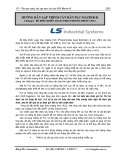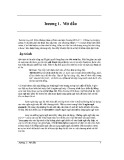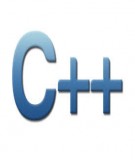
Conversion of Decimal to any Base (Binary, Octal or
Hexa) and vice-versa (C#)
By Balamurali Balaji | 27 May 2005
.NET1.0 C# Windows Dev Intermediate
Generic functions written in C# to convert a binary,octal or a hexa-decimal to a decimal number
and vice-versa.
See Also
•Articles like this
•Articles by this author
14
Article Browse Code Stats Revisions
3.03 (16 votes)
Sponsored Links
•Download source and demo files - 10.9 Kb
Introduction
C# conversion functions are very powerful. The Convert class has many methods that perform
typical conversion of a string to integer, and other data types. One of the
functions ToInt64() not only converts a given value to a 64-bit integer but also returns the
number to the specified base.
Collapse
Convert.ToInt64(value,16);
The above function converts a decimal number to hexadecimal number. This is most useful in
situations where you write programs for arithmetic calculations. I thought of writing my own
function that does this kind of conversion. I created two functions, DecimalToBase which
converts any decimal number to a binary, octal or hexadecimal number
and BaseToDecimal which converts any binary, octal or hexadecimal number to the
corresponding decimal number.
The most interesting part is that both the functions are generic in nature. In
the DecimalToBase function, I had to write the algorithm that can perform the conversion of a
decimal to binary, octal or hexadecimal. I had to write the code for all of these conversions within

a single function, still keeping my code reduced to handle all sorts of values. C#?s type-safe
nature prevents us from doing some easier character-int conversions and we just can?t surpass
them, as it would produce adverse results. Same is the case with the BaseToDecimal function.
A sample application to test the conversion functions
•Create a sample Windows application in Visual Studio. NET.
•In the form:
a. Add three label controls named label1, label2, and label3.
b. Add three text box controls named textBox1, textBox2, and textBox3.
c. Place a button control named button1 and set its Text property to ?To Base?.
d. Place another button control named button2 and set its Text property to ?To
Base?.
•Write the following declarations as data members of the form class:
Collapse
const int base10 = 10;
char[] cHexa = new char[]{'A','B','C','D','E','F'};
int[] iHexaNumeric = new int[] {10,11,12,13,14,15};
int[] iHexaIndices = new int[] {0,1,2,3,4,5};
const int asciiDiff = 48;
•Include the functions as member methods in the form class module.
This function takes two arguments; the integer value to be converted and the base value
(2, 8, or 16) to which the number is converted to:
Collapse
string DecimalToBase(int iDec, int numbase)
{
string strBin = "";
int[] result = new int[32];
int MaxBit = 32;
for(; iDec > 0; iDec/=numbase)
{
int rem = iDec % numbase;
result[--MaxBit] = rem;
}
for (int i=0;i<result.Length;i++)
if ((int) result.GetValue(i) >= base10)
strBin += cHexa[(int)result.GetValue(i)%base10];
else
strBin += result.GetValue(i);
strBin = strBin.TrimStart(new char[] {'0'});
return strBin;
}

This function takes two arguments; a string value representing the binary, octal, or
hexadecimal value and the corresponding integer base value respective to the first
argument. For instance, if you pass the first argument value "1101", then the second
argument should take the value "2".
Collapse
int BaseToDecimal(string sBase, int numbase)
{
int dec = 0;
int b;
int iProduct=1;
string sHexa = "";
if (numbase > base10)
for (int i=0;i<cHexa.Length;i++)
sHexa += cHexa.GetValue(i).ToString();
for(int i=sBase.Length-1; i>=0; i--,iProduct *= numbase)
{
string sValue = sBase[i].ToString();
if (sValue.IndexOfAny(cHexa) >=0)
b=iHexaNumeric[sHexa.IndexOf(sBase[i])];
else
b= (int) sBase[i] - asciiDiff;
dec += (b * iProduct);
}
return dec;
}
•Write the code in the click event of the buttons as follows:
On clicking the first button, you can convert a decimal number to any base you select in
the ComboBox.
Collapse
private void button1_Click(object sender, System.EventArgs e)
{
textBox3.Text = DecimalToBase(Int32.Parse(textBox1.Text),
Int32.Parse(comboBox1.Text));
}
On clicking the second button, you can convert the base number you have selected in
the ComboBox (binary, octal, or hexadecimal) to a decimal number.
Collapse
private void button2_Click(object sender, System.EventArgs e)
{
textBox3.Text = BaseToDecimal(textBox1.Text,
Int32.Parse(comboBox1.Text)).ToString();

}
•Save the project. Build the solution.
•Output is as shown below:
Sample Output #1:
Sample Output #2:
Sample Output #3:


![Giải pháp cứng hóa phép nhân điểm Elliptic trên trường GF [Tối ưu SEO]](https://cdn.tailieu.vn/images/document/thumbnail/2022/20221208/hoabingan205/135x160/8791670485155.jpg)














![Tài liệu ôn tập môn Lập trình web 1 [mới nhất/chuẩn nhất]](https://cdn.tailieu.vn/images/document/thumbnail/2025/20251208/hongqua8@gmail.com/135x160/8251765185573.jpg)









